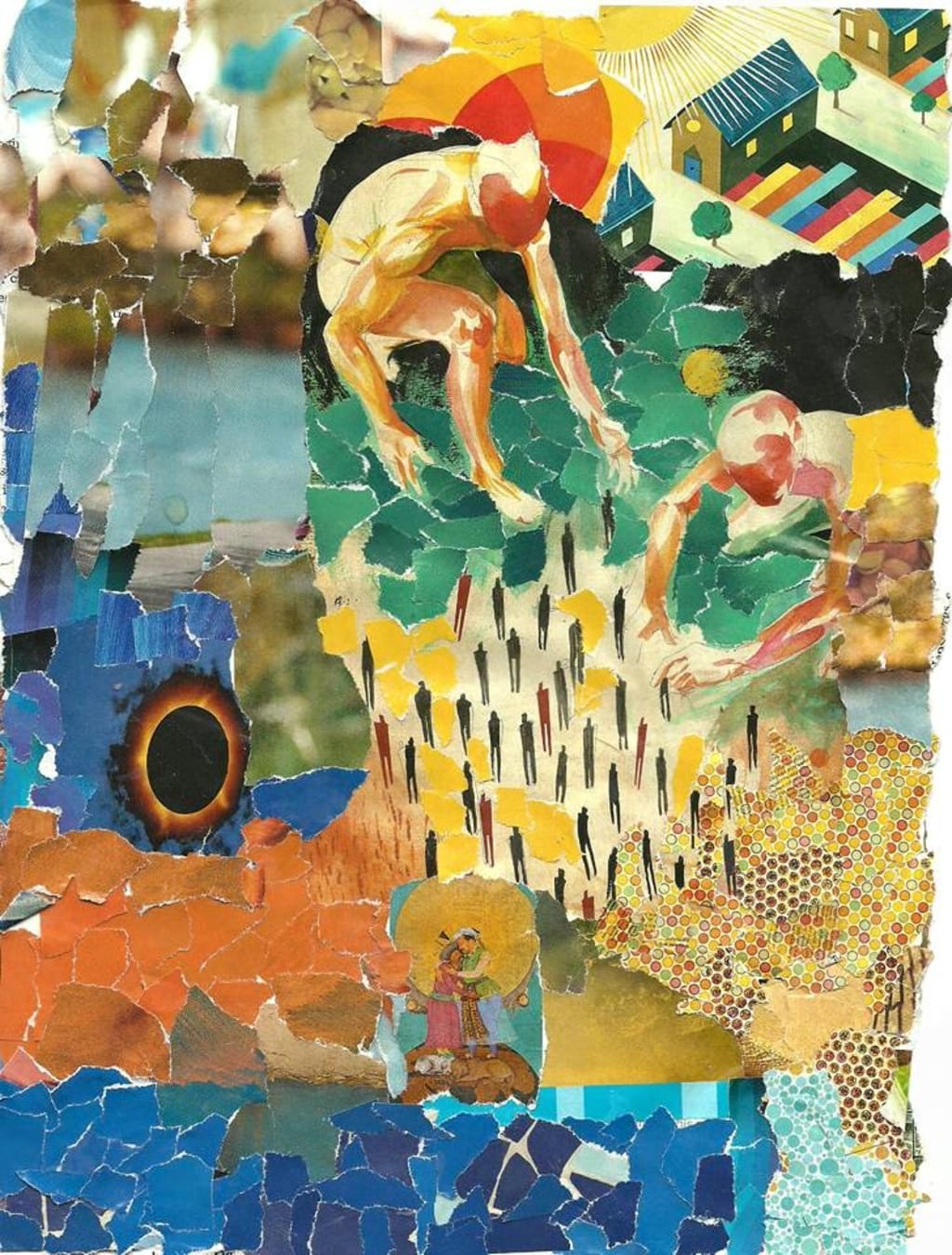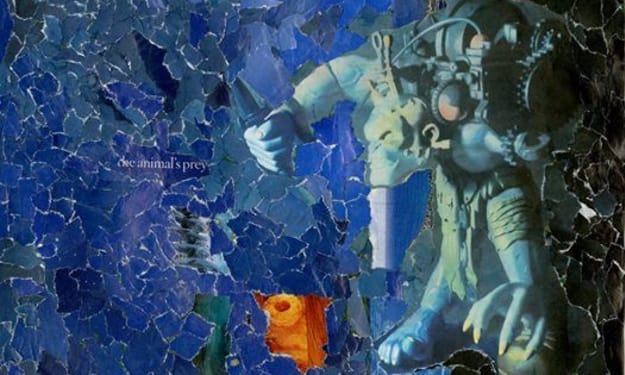Shoulders of Knees
The Citizens of Theo Huxtable

John Anomalies sold real estate for Shoulders of Knees long before he knew his whole world was inside the body of Theo Huxtable.
Everything was full of bright light, unexpected in retrospect for inside-a-body, and covered in blue and white mosaic tile like the most magnificent bathrooms and worship places, but that was the trend those ideal days of Shoulders of Knees real estate, to make every bodily living space bright and sanitary.
He loved the landscapes inside Theo Huxtable, how the hilltops in Shoulders of Knees gave him a view of column after column extending out in every direction from Shoulders of Knees, columns of houses and roads all the way around the column, top and bottom, people standing perpendicular to him and parallel to one another, head to head only a hundred feet apart, neighbors looking up at each other to converse, kids tossing four square balls up at each other until the other-direction gravity caught it and pulled it to the opposite-side child.
They tried, as all children inside the columns of Theo Huxtable tried at one time in their childhood, to bounce back all the way back and forth so it would continue bouncing forever, the impossible dreams of children. What could be more delightful? All this closeness made him feel like always being hugged, like all his life he lived inside a cuddling family.
He knew all the architectural styles (covered in the new trends by white and blue tiles) and cataloged them in his head whenever he surveyed Shoulders of Knees. All the names were based on mythology: Tudor (named after the mythological Tudor family); Second Empire (named after the rule of a mythological king named Napoleon); Ranch (named after this mythological notion of farmland).
John Anomalies knew about the mythology of open spaces due to televisions mounted on the tile ceilings (mounted in ancient times by ancient human leaders) that played open space images (allowing all the closed in Theo Huxtable people to imagine the frightening alternative).
That’s how he knew there was an entity called Theo Huxtable.
One day his neighbor lady, Widow Marmalade, told him, “Did you hear about what happened in science lately?”
“I don’t much keep up with science, Widow Marmalade.” But he indulged this scientifical business because he would indulge anything from Widow Marmalade.
“They say our whole world is inside Theo Huxtable.”
“Ya don’t say,” he said and went back inside sipping his coffee. He thought about his precious houses, as entirely house-like as the ones Theo Huxtable lived in (except this weird notion Theo Huxtable’s world of one-directional gravity). He looked at his hands, as entirely human as Theo Huxtable’s hands, his knees and shoulders as entirely human as Theo Huxtable’s knees and shoulders. Except Theo Huxtable had people inside him.
He went to the doctor and said, “Doctor, I don’t normally indulge in this scientifical business, but I was wondering if you could explain what I am and what I got inside me.”
The doctor, Dr. Zigzag, with a jolly attitude requisite of Theo Huxtable people and a big white beard and a nice, comfortable-looking blue and white checked sweater, said, “Oh, boy, let me tell ya, I’ve had a lot of that kind of question since the Theo Huxtable revelation. Let me assure you that everybody’s got the same stuff inside of them: bones, muscles, organs, all the stuff that makes us humans.”
Dr. Zigzag even offered to give him an X-Ray to prove it, said he did it a million times before. But no thanks, no science needed. Still, John Anomalies stayed up nights thinking about all that empty space that must be outside of Theo Huxtable.
All that infinite empty space.
Theology inside Theo Huxtable was based on a lingam-yoni-like pansexual deity called the Claircliff. Claircliff had the capacity to “ground” sinners (as this one-directional gravity seemed so terrifying, this must be why grounding was a punishment) and he/she delivered mysterious admonitions like “You were off being wild and free with the Wretched and singing the Wretched song! How did it come to pass that you did not get into the concert with the Wretched, and the big fun?”
Supplicants spent ages parsing through such mysterious speeches, but not John Anomalies who knew this one little space, the Shoulders of Knees, inside the body of Theo Huxtable so well, everything else filled his dream life with the shaky cracking of tiles. The warm certainty of the Claircliff kept his dream brain from cracking open. It gave it all a beyond meaning that wasn't any of John's business to know.
The Claircliff television shows that played constantly in intraHuxtable spaces painted the Claircliff comically as two separate beings, a married couple named Clair and Cliff (what absurdity) and a seemingly endless train of their godling babies including Theo who formed the body of the world. They were so tightly packed in that home, it seemed like paradise, and John wondered why they’d ever want to step outside.
Now, alone in his bed and staring at the ceiling and contemplating the infinity beyond, John repeated, “The Claircliff knows all beyond our capacity to know. The Claircliff’s wisdom is unquestionable. The Claircliff’s ways are a mystery.”
This gave him the strength and courage to finally rise (though sleep was now beyond him).
He wondered around his empty house. At times like this, he hated living alone.
John Anomalies had no interest in having a wife or babies. The Claircliff gave him enough of a similar sort of comfort. At least that’s what he told himself.
The truth is talking to potential wives was an embarrassing freefall into rehearsed factoids about real estate (“Do you know about the Napoleon mythology?”) or religion (“Are you aware of the theological implications of Different World blasphemies?”) but never anything about himself, a mortifying emptiness, and John wondered often if there even was a self to talk about.
Then there was Widow Marmalade who lived next door. She was John’s age but still a widow, and John wondered how anybody got to be a widow at this age, but he let the mystery remain.
Her welfare concerned John most days, and this gave him something other than real estate to talk about: “How you doing today Madam Doohickey, hope your day brings you light and love as the Claircliff smiles upon you,” and so on.
Her obsession in all her conversations these days was this Theo Huxtable business: “I mean I know the Claircliff show says the world was made of Theo's body, but I figured that was only stories. But to even think we live inside another's body...I don't know what to make of it.”
“Somehow … it all seems okay.” John’s nightly mantra made him think this might be true.
“But what if we all have tiny worlds inside of us?” This was a world-shattering concept John had convinced himself no longer to consider.
If there really were worlds inside everyone, everyone would need their own Claircliff, at least the way John Anomalies conceived of the God-and-world relationship. But, Widow Marmalade had nobody to be her world's God and give the tiny people inside her moral guidance.
So one day passing one another in that neighborly way, he grabbed her shoulders and said, “I have something to say to the little people inside of you,” but he had nothing to say, no original moral guidance inside him. This just wasn’t John Anomalies. He had nothing inside him but Claircliff rehashings he barely understood.
So for once, with the pressing need of all those poor, unfortunate, unguided tiny people inside of Widow Marmalade, he looked down in his true core and spoke the wisdom he discovered there: “You can fly.”
This made no sense, and Widow Marmalade's baffled face showed it. In truth, it made no sense to John Anomalies either, but the wisdom of any world’s god was rooted in mystery.
He tried again: “You can fly. We all can fly. Everyone can fly. There is no such thing as gravity.” No matter what he tried to say, this is all that came out. So he let her go, took a step back and said, “Nice day. I'll be seeing you around.”
But he couldn't show his face again. Every interaction he had with potential wives his whole life had been mortifying. Widow Marmalade was the only one he was able to pleasantly speak with without conversational rehearsal or go-to neutral factoids. That was all shattered by this flying nonsense.
The truth is they could fly because why not? Flying really was a skill with which his people were naturally endowed. It made no sense, but John had no concept of how thoroughly mystery permeated his existence.
Widow Marmalade flew to his window not long after he told her she could fly, and she said, “Mr. Anomalies, what say we see what the outside of the Theo Huxtable looks like.” She grabbed his hand, and he likewise lifted off the ground with as little effort as walking.
They flew away together, laughing like little kids up the column of houses on every side. John Anomalies no longer considered the terror of the outside spaces, as long as he held her hand.
But then the column closed in, and the houses rose like the sort of bumpy landscape John knew well in Shoulders of Knees. In this column, however, the houses had to squeeze together until there was hardly any passageway but one small walking path.
All the Second Empire houses seemed to be recovering from some catastrophe, trusses made of bonewood, ropes of sinews holding shattered roofs together, citizens wobbling in their weird gravity walk over house rubble and trying not to bump heads.
John stopped one of the weary-looking column citizens and said, “What is this? What happened here?”
“I reckon Theo Huxtable’s got what they call a cancer,” said the column citizen. “I reckon our world’s not going to live much longer.”
Widow Marmalade pulled John toward the walking path opening and said, “Come on, we can make it through. We can make it out of here.”
But John pulled back against her tugging.
The solid ground felt too good on his feet.
About the Creator
F. Simon Grant
I'm a fiction writer and a collage artist.






Comments
There are no comments for this story
Be the first to respond and start the conversation.